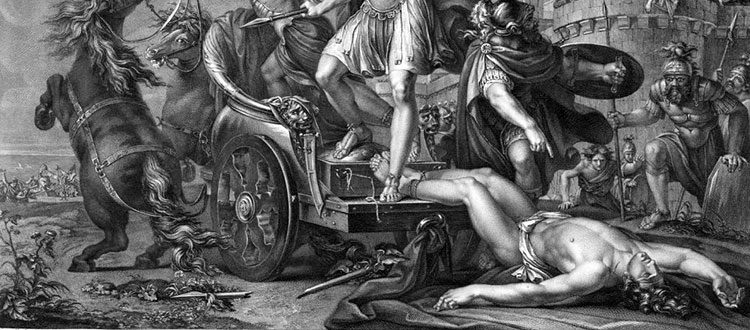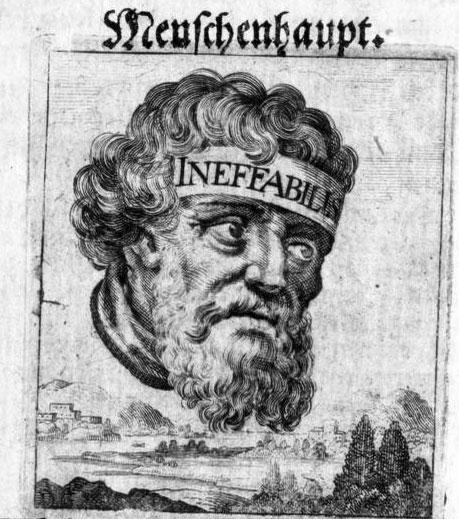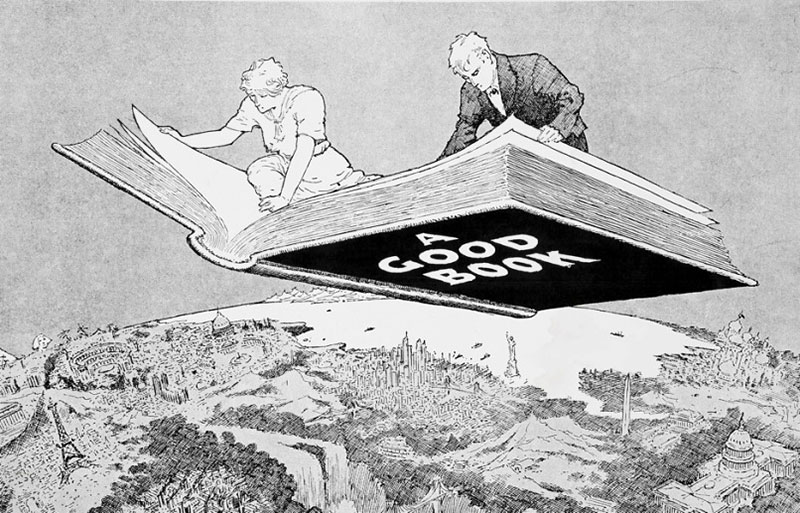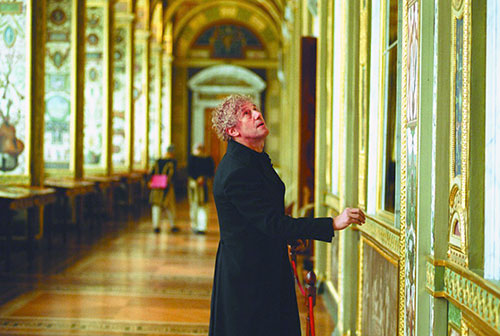January 2015
dappled things
13 January 2015, around 11.34.

Crambe repetita (34)
15 January 2015, around 5.17.
His odd grey eyes seemed to contradict his lips; they had a look in them which made the sincerity of his compliments very doubtful. And then he said very cutting things about other people. They were not exactly witty; they were certainly not profound; but they were so skillful, so adroit — they had a twist in them which made them slip into the mind and stay there when more important phrases were forgotten. He had downed the Regent himself with his dexterous ‘Who’s your fat friend?’ and his method was the same with humbler people who snubbed him or bored him. ‘Why, what could I do, my good fellow, but cut the connection? I discovered that Lady Mary actually ate cabbage!’— so he explained to a friend his failure to marry a lady.
Montaigne 1.1
16 January 2015, around 19.26.

Achilles in exanimem Hectora saevit, Domenico Cunego after Gavin Hamilton, 1766
Having another go at Montaigne’s Essais, 1 one of those books I always make a brave run at, but abandon a third of the way through, brushed away from the mindset of the book into arbitrary business.
I’m not quite sure what to make of the first essay, ‘By various means we arrive at the same end’. I was pleased to see Skanderbeg (whom I probably would have imagined as Greek pirate if I had read the book when I first bought it), but I’m not quite sure which ‘end’ is reached by ‘various means’. At first it appears that Montaigne is referring to clemency, achieved either through supplication or through bravado, but the essay takes a dark twist with Alexander the Great who, ‘so gracious to the vanquished’, orders a truculent captive to be hooked by the heels to the back of a chariot and dragged to death. Montaigne goes on to wonder why Alexander had done this – whether he was so brave that he didn’t admire bravery in others, or was just grumpy that day, or any number of other reasons – but despite the unanswerability of this speculation, the result was the same and the man was killed – his life being in Alexander’s hands whether he acknowledged that fact or not. A gloomy and rather disheartening approach to the future, surely.
- I had picked up Trechmann’s translation many years ago in a handsome double-decker, two-volumes-in-one, red-bound monstrosity about the size of a family bible.[↩]
at rest
18 January 2015, around 6.52.
Considered at any two contiguous points of time, every real entity is either in motion or at rest.
Now, when a real entity is said to be at rest, it is said to be so with reference to some other particular real entity or aggregate of real entities; for so far as any part of the system of the universe is perceived by us, we at all times perceive it not to be at rest. Such, at least, is the case not only with the bodies called planets, but with one or more of the bodies called fixed stars; and, by analogy, we infer this to be the case with all the rest.
This premised, considered with reference to any two contiguous points of time past, every perceptible real entity was, during that time, either in motion or not in motion; if not in motion, it was at rest.
Here, then, we have two correspondent and opposite fictitious entities of the first remove, viz. a motion and a rest.
A motion is a mode of speech commonly employed; a rest is a mode of speech not so commonly employed.
To be spoken of at all, every fictitious entity must be spoken of as if it were real. This, it will be seen, is the case with the above-mentioned pair of fictitious entities of the first remove.
A body is said to be in motion. This, taken in the literal sense, is as much as to say, here is a larger body, called a motion; in this larger body, the other body, namely, the really existing body, is contained.
So in regard to rest. To say this body is at rest is as much as to say, here is a body, and it will naturally be supposed a fixed body, and here is another body, meaning the real existing body, which is at that first-mentioned body, i.e. attached to it, as if the fictitious body were a stake, and the real body a beast tied to it.
the long road
19 January 2015, around 7.56.

From time to time out of the text there emerged little black figures which postured on the white paper beside it, achieved a group which was magical, an incantation to death, and ran back again into the text, which carried on its story of the main and legitimate historical process.
I’m not quite sure what to say. It’s been two and a half years that I’ve been reading – actively reading – Black Lamb and Grey Falcon and I’ve finally finished it. I don’t think I’ve ever taken quite so long to read a book and still felt, through the duration, that I’ve been reading it. I think I may have to begin and read it again, to take in the embroidery, the historical excursus, the lamentations over the ill-mannered Gerda. It is vast and sprawling and it could have been four or five books – indeed, it is four or five books all jumbled together. One wishes that more travel writing were like it – while remaining thankful that this is not the case.
Curio (5)
21 January 2015, around 10.28.

Montaigne 1.2
23 January 2015, around 19.30.

A passion which may be relished and digested is but a poor thing.
Montaigne on sadness appears to be about excess of emotion rather than sadness as such – are the effects of emotion cumulative, is the inexpressible emotion stronger than that which may be vented with tears or sighs? It is at first odd that he turns from the stories of Psammenitus and Agamemnon watching their families suffer (and being themselves the cause of that suffering) to a more general consideration of love, but given that love is at least in part the cause of the sadness felt in these cases, I suppose the transition is not as opaque as it seems. The list of people who died from joy was an absurd addition, though, and the story of Diodorus the dialectician who died of shame on being unable to answer his opponent’s argument reaches the highest flats of the bathetic. This is perhaps to be expected from one who boasts:
I am little subject to these violent passions, being naturally slow to apprehend, and this tendency becomes every day more crusted over and hardened by reason. 1
- Which makes Montaigne sound like a meringue.[↩]
the printer’s mark
25 January 2015, around 10.41.

Winsor McCay, A Good Book (not the book in question)
It is not that the book is badly designed. No. The typeface suits and the pages are pleasingly laid out out. There are suitable illustrations, photos of the poet at various stages in her career – the ordinary image-making of an attractive woman. No. The problem is that it is so poorly printed: the letters fizz into illegibility at their effete serifs, the images suffer at once from digital distortion (blockish jpeg artifacts) and from being printed at too large a screen so the details disappear between the dots. In one picture one cannot tell if a large hat casts an enormous shadow, or if the poet has painted her eyebrows on with Groucho-style greasepaint. In another, her face is reduced to a death’s-head with pinpoint rodent eyes and cavernous nostrils. A third, informal shot, could be of anybody’s grandmother, washed-out and pale in a room with too many modern conveniences and not enough comfort. What is to be done?
stulta navis
27 January 2015, around 5.21.

It should have been a good movie – who doesn’t like a sweeping epic that forges in a crucible of technical constraints the consciousness of a nation? Certainly I do. Yet. Watching Russian Ark I was reminded of nothing more pleasant than wandering through an unfamiliar museum with a colossal bore, who will keep pointing out the ferbelows when all one wants to see are the tchotchkes. Worse still, a boor whose sense of reality and of the comparative importance of details are sorely misguided: as though Pushkin were merely a set of womanizing sideburns; as though the 1890s were clad in polyester; as though all hairpieces were of necessity plasticine. One is meant to be moved – and one is: to annoyance. It was like one of the set pieces one finds left over in provincial soviet museums: taxidermy, not history, let alone culture. 1
- In short, I was disappointed.[↩]
Montaigne 1.3
30 January 2015, around 19.12.

We are never at home with, but always beyond, ourselves. Fear, desire, and hope impel us into the future, and rob us of the sense and consideration of that which is, in order to keep us musing over that which will be, even when we shall cease to be.
Notes on ‘Our feelings continue beyond this life’:
- The curious rant against democracy, for the Athenians demanding that their generals collect their dead rather than push a military advantage; the fear of each individual for being abandoned, ultimately dooming the whole.
- The role of relics, morbid and powerful; talismans. The requirement of physical presence for the application of power. How does that relate to the abandoned Athenians?
- Speaking truth to power: the two soldiers who told Nero just what they thought of him to his face – rather than waiting until he was dead.
- On too much care about what happens after one dies – either the desire to maintain privacy (the Emperor Maximilian who ‘expressly ordered that after death his parts should be hidden by drawers’ – with Montaigne’s charming comment: ‘He ought to have added, by codicil, that the man who put them on should be blindfold’) or show (as with Montaigne’s kinsman who frittered away his last gasps with arranging his own funeral). At the mercy of the world’s memory.
- The irruption of quotation – disrupting and altering the flow of thought. Perhaps the turn of thought was already there and the quotation was meant to bridge or mask it.
- Funeral obsequies turn to sour wine and salted venison.
